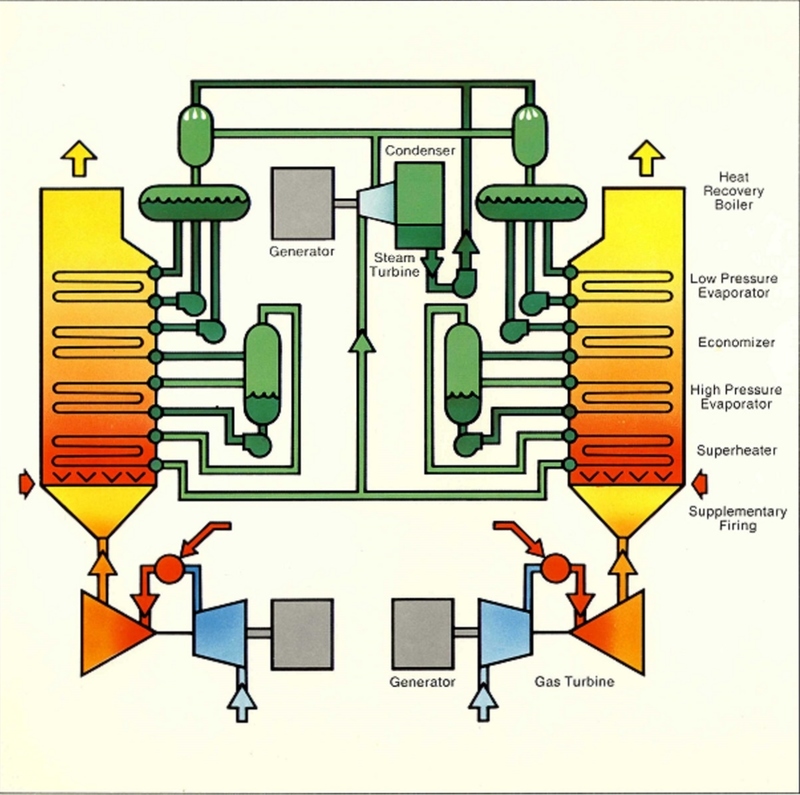PACE 320 Combined-Cycle Power Plant Diagram
Dublin Core
Title
PACE 320 Combined-Cycle Power Plant Diagram
Alternative Title
PACE Combined-Cycle Plant
Subject
Energy--United States
Description
A simplified power cycle diagram depicting the concept in which two Westinghouse 501 (W501) gas turbines exhaust into individual heat recovery steam generators (HRSGs) and produce steam for a 100 MW steam turbine. In 1970, Westinghouse introduced the Power at Combined Efficiency (PACE) pre-engineered combined-cycle power plant concept. The Power at Combined Efficiency (PACE) Engineering Manager was Paul A. Berman, who is often considered "The Father" of the Westinghouse combined-cycle plant. With the Westinghouse 501D rated at approximately 100 MW, the total power output of the Power at Combined Efficiency (PACE) plant was approximately 300MW.
Originally called the Westinghouse Electric Company, George Westinghouse (1846-1914) founded his manufacturing company in Pittsburgh, Pennsylvania, on January 8, 1886. In 1889, he renamed his business The Westinghouse Electric and Manufacturing Company. Westinghouse's primary products include turbines, generators, motors and switchgear related to the generation, transmission, and use of electricity. The company changed its name to Westinghouse Electric Corporation in 1945. In 1981, the company began to relocate its division headquarters for the Steam-Turbine Generator Divisions from Pennsylvania (turbines from Lester and generators from Pittsburgh) to Orlando, Florida. The Power Generation Business Unit (PGBU) building was located in The Quadrangle, at 4400 Alafaya Trail. Originally, Westinghouse had purchased a large plot of land for future development that extended westward from Alafaya Trail to Rouse Road. The original headquarters was located on several acres of that land parcel close to Alafaya Trail.
As the PGBU grew in size, other buildings were rented and then, after PGBU was sold to Siemens Corporation, additional buildings were added to the complex. In 1994, after a major corporate management shuffling and commitment to change from an industrial manufacturing company to primarily a broadcasting/communications company, Westinghouse bought the CBS Network and changed its name to the CBS Corporation. As the PGBU grew in size, other buildings were rented and then, after PGBU was sold to Siemens Corporation in 1998, additional buildings were added to the Quadrangle.
Originally called the Westinghouse Electric Company, George Westinghouse (1846-1914) founded his manufacturing company in Pittsburgh, Pennsylvania, on January 8, 1886. In 1889, he renamed his business The Westinghouse Electric and Manufacturing Company. Westinghouse's primary products include turbines, generators, motors and switchgear related to the generation, transmission, and use of electricity. The company changed its name to Westinghouse Electric Corporation in 1945. In 1981, the company began to relocate its division headquarters for the Steam-Turbine Generator Divisions from Pennsylvania (turbines from Lester and generators from Pittsburgh) to Orlando, Florida. The Power Generation Business Unit (PGBU) building was located in The Quadrangle, at 4400 Alafaya Trail. Originally, Westinghouse had purchased a large plot of land for future development that extended westward from Alafaya Trail to Rouse Road. The original headquarters was located on several acres of that land parcel close to Alafaya Trail.
As the PGBU grew in size, other buildings were rented and then, after PGBU was sold to Siemens Corporation, additional buildings were added to the complex. In 1994, after a major corporate management shuffling and commitment to change from an industrial manufacturing company to primarily a broadcasting/communications company, Westinghouse bought the CBS Network and changed its name to the CBS Corporation. As the PGBU grew in size, other buildings were rented and then, after PGBU was sold to Siemens Corporation in 1998, additional buildings were added to the Quadrangle.
Source
Original diagram: PACE: The Westinghouse Combine Cycle Packaged Powerplant. Westinghouse Electric Corporation: Private Collection of Harry L. Jaeger.
Date Created
ca. 1970-1975
Contributor
Jaeger, Harry L.
Is Format Of
Digital reproduction of original diagram: PACE: The Westinghouse Combine Cycle Packaged Powerplant. Westinghouse Electric Corporation.
Is Part Of
Westinghouse Electric Collection, RICHES of Central Florida.
Format
image/jpg
Extent
405 KB
Medium
1 diagram
Language
eng
Type
Still Image
Coverage
Lester, Pennsylvania
Accrual Method
Donation
Mediator
History Teacher
Rights Holder
Copyright to this resource is held by Siemens and is provided here by RICHES of Central Florida for educational purposes only.
Curator
Jaeger, Harry L.
Cepero, Laura
Digital Collection
External Reference
"PACE: The Westinghouse Combine Cycle Packaged Powerplant." RICHES of Central Florida. https://richesmi.cah.ucf.edu/omeka/items/show/6593.
"History." Westinghouse Nuclear. http://www.westinghousenuclear.com/About/History.
"Westinghouse Power Generation Booklet." RICHES of Central Florida. https://richesmi.cah.ucf.edu/omeka2/items/show/6422.
Collection
Citation
“PACE 320 Combined-Cycle Power Plant Diagram,” RICHES, accessed March 4, 2026, https://richesmi.cah.ucf.edu/omeka/items/show/7738.
